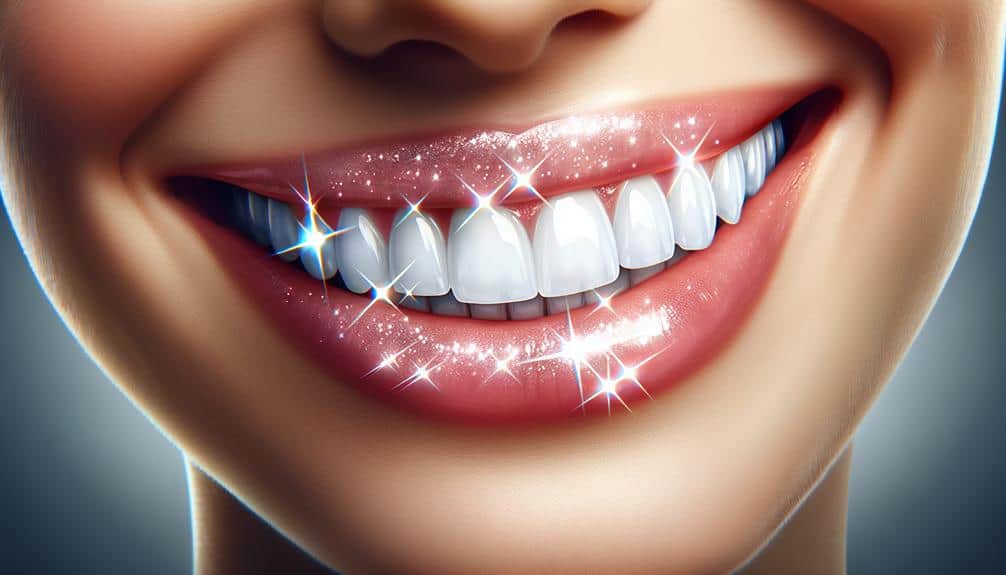If you're looking for safe whitening solutions for sensitive teeth, consider non-peroxide whitening gels that are gentle on enamel and offer a secure alternative to traditional whitening products. LED light devices can enhance the whitening process by accelerating chemical reactions when used with whitening strips or trays. Charcoal-based powders, coconut oil pulling, and baking soda toothpaste also provide gentle options that may suit your sensitivity concerns. These choices can be effective and safe for achieving a brighter smile.
Key Points
- Non-Peroxide Whitening Gels are gentle and protect enamel.
- LED Light Whitening Devices enhance whitening with specific light wavelengths.
- Charcoal-Based Whitening Powders offer gentle abrasiveness for sensitive teeth.
- Coconut Oil Pulling is a natural, antimicrobial option for whitening.
- Baking Soda Toothpaste is a safe, affordable solution for a brighter smile.
Non-Peroxide Whitening Gels
If you have sensitive teeth, consider using non-peroxide whitening gels as a safer alternative to traditional whitening products. These gels are formulated with gentle ingredients that are less likely to cause sensitivity while still effectively whitening your teeth. The gentle formulas in non-peroxide whitening gels help protect the enamel from damage, which is vital for individuals with sensitive teeth prone to erosion.
When selecting a non-peroxide whitening gel, look for products that specifically mention enamel protection. These gels are designed to be less abrasive, reducing the risk of enamel wear compared to peroxide-based alternatives. By choosing a non-peroxide option with enamel protection, you can safely whiten your teeth without compromising their strength and health.
Non-peroxide whitening gels are an excellent choice for individuals with sensitive teeth who want to brighten their smiles without the discomfort often associated with traditional whitening products. Prioritizing enamel protection through the use of these gentle formulas can help you achieve a whiter smile while maintaining your oral health.
LED Light Whitening Devices
LED light whitening devices utilize advanced technology to enhance the whitening process and achieve brighter smiles efficiently and effectively. These devices work by emitting a specific wavelength of light that activates the whitening agent present in products like whitening strips or trays. When used in conjunction with these products, the light accelerates the chemical reaction, leading to faster and more noticeable results.
Whitening strips are thin, flexible strips coated with a whitening gel that's applied directly to the teeth. The LED light helps in activating the gel's ingredients, allowing for a more thorough and even whitening effect. On the other hand, whitening trays are custom-fitted trays filled with a whitening solution that covers the teeth entirely. The LED light aids in speeding up the whitening process, ensuring that all teeth receive consistent whitening.
When opting for LED light whitening devices, be sure to follow the manufacturer's instructions carefully to achieve best results without causing sensitivity or damage to your teeth.
Charcoal-Based Whitening Powders
Utilize charcoal-based whitening powders as a gentle yet effective alternative to traditional whitening methods for a brighter smile without compromising tooth sensitivity. Charcoal-based whitening powders have gained popularity due to their ability to whiten teeth effectively while being gentle on sensitive teeth. Here's why they may be suitable for you:
- Gentle Abrasiveness: Charcoal powders offer a mild abrasive action that can help remove surface stains without causing sensitivity concerns often associated with harsher whitening products.
- Natural Ingredients: Many charcoal-based powders contain natural ingredients that can be soothing for sensitive teeth, making them a preferred choice for individuals with sensitivity concerns.
- Effectiveness Debate: While the effectiveness of charcoal-based powders is a topic of debate in the dental community, many users report noticeable whitening results. However, to achieve the best outcomes, use these products as directed.
When considering charcoal-based whitening powders, weigh the effectiveness debate against your sensitivity concerns to make an informed decision for a brighter, whiter smile.
Coconut Oil Pulling for Whitening
When exploring alternatives to charcoal-based whitening powders, consider the potential benefits of incorporating coconut oil pulling into your oral care routine for a natural approach to teeth whitening. Coconut oil pulling is an ancient Ayurvedic practice known for its potential oral hygiene benefits. The process involves swishing a tablespoon of coconut oil around in your mouth for about 15-20 minutes, allowing the oil to pull out bacteria and debris. This natural remedy is believed to not only promote oral health but also help whiten teeth over time.
Coconut oil contains lauric acid, which has antimicrobial properties that can contribute to improved oral hygiene by reducing harmful bacteria in the mouth. Additionally, its anti-inflammatory properties may help alleviate gum inflammation. While coconut oil pulling is generally safe, it's essential to remember that it isn't a replacement for regular brushing and flossing. Incorporating this practice into your oral care routine can complement your overall dental hygiene regimen, offering a natural alternative to traditional whitening methods.
Baking Soda Toothpaste for Whitening
Consider using baking soda toothpaste as a gentle and effective option for whitening your teeth naturally. Baking soda, also known as sodium bicarbonate, is a common household ingredient that can help remove surface stains on teeth without being too abrasive. Here are three reasons why baking soda toothpaste can be a great choice for whitening:
- Natural Ingredients: Baking soda is a natural ingredient that's often used in DIY remedies for various purposes, including teeth whitening. Its mild abrasive properties can help scrub away stains gently without harming the enamel.
- Effective Stain Removal: Baking soda toothpaste can effectively remove surface stains caused by coffee, tea, or certain foods. Its gentle abrasiveness can help lift these stains, revealing a brighter smile over time.
- Affordability and Accessibility: Baking soda toothpaste is a cost-effective option compared to professional whitening treatments. It's readily available in most stores and can be easily incorporated into your oral care routine.
Frequently Asked Questions
Can Sensitive Teeth Be Safely Whitened With Non-Peroxide Whitening Gels?
If you have sensitive teeth, consider non-peroxide whitening gels to avoid gel sensitivity. These alternatives can be safe and effective for whitening. Always consult with your dentist to guarantee the best option for you.
How Often Should LED Light Whitening Devices Be Used for Best Results on Sensitive Teeth?
For best results on sensitive teeth, LED light whitening devices should be used with caution. Limit usage to once a week to prevent exacerbating sensitivity. Consult with a dentist for personalized advice on whitening frequency.
Are There Any Potential Side Effects of Using Charcoal-Based Whitening Powders on Sensitive Teeth?
To manage sensitivity, avoid charcoal-based whitening powders as they can be abrasive. Consider gentler alternatives like whitening toothpaste for sensitive teeth or professional treatments. Always consult your dentist for safe whitening solutions.
Is Coconut Oil Pulling Recommended for Whitening Sensitive Teeth, and How Long Should It Be Done For?
Feeling the allure of coconut oil pulling for whitening sensitive teeth? This ancient practice may enhance your smile. While it's generally safe, be cautious of potential drawbacks. Aim for consistency but don't overdo it.
Are There Any Risks or Concerns Associated With Using Baking Soda Toothpaste for Whitening on Sensitive Teeth?
When using baking soda toothpaste for whitening, be cautious with sensitive teeth. Baking soda's abrasiveness may worsen sensitivity or enamel wear. Consider gentler toothpaste options tailored for sensitive teeth to minimize risks and enhance whitening results.
Conclusion
To sum up, there are many safe whitening solutions available for those with sensitive teeth. By opting for non-peroxide gels, LED light devices, charcoal powders, coconut oil pulling, or baking soda toothpaste, you can achieve a brighter smile without causing discomfort.
It's important to choose gentle methods that prioritize the health of your teeth and gums, ensuring a gentle yet effective whitening experience. Choose wisely and enjoy a radiant smile with peace of mind.



